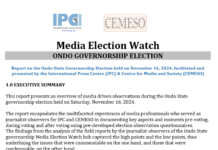By its reputation, the 2018 governorship election in Ekiti State might go down in history as about the most peaceful. Apart from the election holding as planned, there were no reports of kidnapping, murder, snatching of ballot boxes and, if any in the latter case, such was negligible. Sacking of courts in session? None. Large number of soldiers and armed policemen initially alleged to have been brought in to rig the elections as was in 2014 limited themselves strictly to security duties.
Indeed, without such security presence, we might be reviewing the exercise completely differently today. Remarkably, not a single foreign or local election observer reported any reservation or criticism of the election as conducted by the Independent National Electoral Commission (INEC).
However, it was both sad and fortunate that voters allegedly reduced themselves to cheap commodity to be purchased by the major contestants. Fortunately, none of them could claim righteous indignation as voters themselves were willing accomplices. The real worry is the helplessness of law enforcement in combating such electoral offence without being accused handicapping one side against the other. Who were the losers? The electorate, opting for the wealthier of the two contestants. If the Ekiti election were held 10 times, vote buying would still not only feature but also determine the outcome, as voters themselves would not exercise their right without collecting money. That is the self-harm voters unconsciously cause themselves.
Even if a voter collected N100,000 from all contestants outbidding one another, would that sudden “windfall” provide roads, security, education, health, houses, etc? There lies the naivety, ignorance and stupidity of the voters allowing themselves to be purchased instead of judiciously exercising their voting right for genuinely suitable candidate who, in all fairness, cannot now be distinguished in view of the “free for all” vote buying.
That very idea and the source of the huge amount allegedly openly distributed to voters must be disturbing. Instead of standing out as untainted, contestants in the election resorted to “me too” defence tactics. Only looted funds could find no value during elections. Are we still pointing accusing fingers at looters of public funds?
Security personnel, soldiers and policemen, left an enviable mark throughout the election. Of course, they merely discharged their duties. Still, they must be acknowledged. That is the positive side. Against that is the concern over such large number of security personnel for a single governorship election. So it was in Anambra and it was the same situation in Edo State. Is that now the standard? In 2019, there are thirty-two governorship elections on a single day. Will Nigeria have to deploy 30,000 policemen to each state to ensure peaceful voting? Such requires long-term planning to contain anarchists.
The peaceful atmosphere, which marked the Ekiti election, was almost disrupted by the misconduct of Ekiti State Broadcasting Service, which, at a critical stage, started announcing concocted purported election results. Even if unsatisfactory, the law is that only INEC could release election results throughout the country. Despite a series of amendments on the Electoral Act, politicians themselves preserved the clause on INEC as the sole authority.
When the regime of former President Ibrahim Babangida deregulated the broadcast industry under the Structural Adjustment Programme (SAP), I had serious reservations on the fear that religious strife might be incited throughout the country by religious fundamentalists. With over 500 radio and television stations in Nigeria today, my fear has remained unfounded, until the 2018 Ekiti governorship election, when state-owned media could have thrown the state as well as Nigeria eventually into chaos with the false election results. Authors of fake election results might still escape the consequences of their action by claiming immunity. For journalists and engineers on the station concerned, they may discover eventually that they are on their own. These journalists must learn how to disobey unlawful orders.
Around 1982, a newscaster on Enugu State Broadcasting Service announced his resignation on air while reading the news and walked away because, as he said, he just could not continue delivering false reports to listeners. That was at the height of the cut-throat rivalry between ruling NPP and opposition NPN in the state.
What is more, governorship election was held in Anambra and Governor Willie Obiano did not release results. Similarly, election was held in Edo and Governor Adams Oshiomhole did not release election results. Former President Goodluck Jonathan conducted the Edo election and President Muhammadu Buhari conducted the Anambra election.
The regulating body of the broadcast industry was, therefore, in order to have closed down Ekiti State Broadcasting Service. If the staff were held at gunpoint to broadcast the fake results, such extenuating circumstances might be understandable. But overzealous political loyalty?
Unfortunately, the Ekiti broadcasting station’s criminal rascality has thrown other stations in the country into jeopardy as, henceforth, such stations are, in the future, liable to be shut down for even the slightest indiscretion. That is why there should be concern on the power of (life and death), which the National Broadcasting Commission wields at the moment. There is no procedure, no right of appeal and even no right of fair hearing. At the moment, all such essential and constitutional rights will amount to medicine after death, as the offending station would have been shut down

Information Minister Lai Mohammed
Decreed under military rule, the legality of the NBC at the end of military regime lapsed into ordinary law but still with enormous powers. No matter how warranted, the decision to shut a broadcasting station is taken within minutes or, at the longest, within hours, if at all, without trial or defence. It is like accusing a suspect of murder and executing him or sentencing him for life without trial. This clearly violates section 36 of Nigerian Constitution, which guarantees right of fair hearing of citizens (including institutions) being subjected to rule of law.
The power of NBC to shut an offending broadcasting house is not being questioned, especially in the light of irresponsible conduct as displayed during the Ekiti election. However, the law should be amended to make the invocation of NBC power of closing down a broadcasting house strictly conditional on a court order containing allegations against the station concerned. On an election day Why not?
Must there be complete lockdown of all essential services on election day? Thirty-six Federal High Courts in 36 states should be open for sitting specifically for that purpose – to try NBC’s allegations against an offending broadcasting house, which can also be put on notice of its infraction. In the case of the Ekiti broadcasting house, all NBC had to do would have been to approach Federal High Court, Ado, for such an order.
















